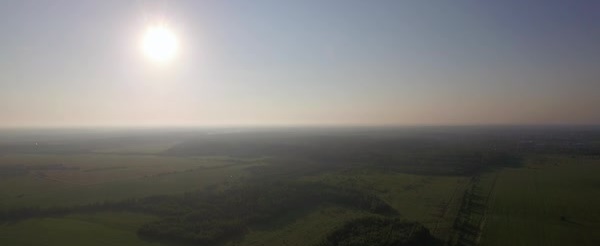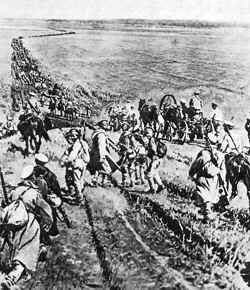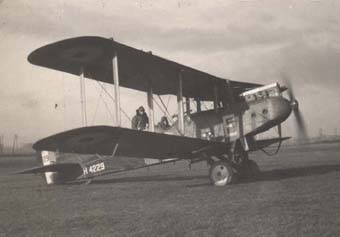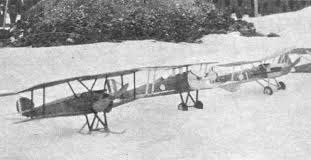So, for a few weeks now I have been attending creative writing evening classes and each week we get set homework. Either we are given a topic or a title and told to write a short story around that incorporating what we discussed in class. One of these homework assignments was the title “My Last Duchess” and this was the story that I came up with. The story is set during the Russian Civil War in 1919 and is told from the perspective of RAF pilot Patrick Phillips, part of the British contingent sent to fight against Lenin’s Bolsheviks.
If you are reading this then thank you for taking the time to have a look and I hope you enjoy it.

From my seat in the DH.9 which offered a striking God’s eye view of the world, southern Russia looked like an immense patchwork quilt of green and brown. Thin grey lines separated fields, plains and small forests looking not too dissimilar to the veins one could find in your wrist. Not unlike veins, these lines were roads carved out by the peasants who had farmed this land for generations under the dictatorship of the Imperial Russian aristocracy but whom were now in open revolt against those former masters.
It was March 1919. The Great War was over and yet the bloodshed continued. The Russian Revolutions of 1917 had left this vast country in a state of brutal and bloody civil war between the Bolsheviks and the so-called “White Russians” – our allies against the spread of Lenin’s communism beyond Mother Russia’s borders. For a Great Britain that was exhausted of war, the British intervention in Russia’s internal feud was unwelcome to say the least and indeed support for the people who were in revolt was high back home and occasionally amongst our own ranks. These people were after all exploited by the rich land owners and a certain sense of universal brotherhood extended across the European continent. Whereas we were the heroes of the Western Front we were now viewed by many as the soldiers against socialist suffrage.
Since I had joined the Army in 1915 my own personal views had been snuffed out through a regime of enforced discipline. Unlike most British pilots I did not come from a wealthy and well-connected background but rather I had to earn my commission serving in the Royal Artillery before transferring to the Royal Flying Corps which now had been reshaped in to the Royal Air Force. Had I still been that 18-year-old lad growing up in the agricultural world of western Somerset I am sure I too would have gotten caught up in the socialist dream. But there was no dream here. Only the continuation of a nightmare.
With the workers themselves being the ones in revolt there was no one left to toil in Russia’s wheat fields or tend to the livestock. Millions were on the verge of starvation and stories of cannibalism had started to creep in to quiet conversations in the mess over a glass of brandy brought in from home by the Royal Navy. The Bolsheviks viewed the British, Canadians, French and Americans who had come to fight them as mercenaries and so reserved a special kind of hatred for us. I was told in no uncertain terms by some of our English-speaking White Russian allies that if we found ourselves having to put down behind enemy lines then the best thing we could do would be to put our revolvers in our mouths and end it quickly rather than be captured and set on fire or castrated before bleeding to death.
I felt a tap on my shoulder and I looked behind me at Michael Chivers, my observer and gunner who sat in his own cockpit behind mine and was surrounded by a steel ring on which his single Lewis machine gun could traverse to aim at a target. With his thickly gloved right palm outstretched he signalled for me to look to my right at our companion DH.9 that sat eighty yards off our wing. The observer in the backseat was signalling us that they had spotted something and after receiving my nod of acknowledgment the other DH.9 began to bank away to the right. With my right foot pushing down on the rudder pedal I leaned the control column over and our right wing dipped as the nose of the aircraft where the V-12 aeroengine growled angrily began to turn in pursuit of the other aircraft.
 Our two large biplanes soared over a crop of trees that stretched out for over a mile and that ended with an old stone road. On the road were horses, carts and men who were now scurrying for cover towards the trees or in to the field on the far side that had become overgrown with long grass from a lack of attention by the farmhands of the area. Their riders having abandoned them, the horses either instinctively stopped or continued clopping along unaware of either their sudden freedom from man’s control or the danger that was approaching them. I didn’t fancy shooting up the horses although it was the usual practice but instead I decided to lay down our two 100lb bombs on the treeline beside the road where I had seen groups of them run.
Our two large biplanes soared over a crop of trees that stretched out for over a mile and that ended with an old stone road. On the road were horses, carts and men who were now scurrying for cover towards the trees or in to the field on the far side that had become overgrown with long grass from a lack of attention by the farmhands of the area. Their riders having abandoned them, the horses either instinctively stopped or continued clopping along unaware of either their sudden freedom from man’s control or the danger that was approaching them. I didn’t fancy shooting up the horses although it was the usual practice but instead I decided to lay down our two 100lb bombs on the treeline beside the road where I had seen groups of them run.
I signalled to Michael with my left hand my intentions but suddenly he gripped my thickly covered arm and pointed out to the left for me to look at something. There in the distance I saw another aircraft, a British-made Sopwith Snipe draped in green paint that was already swooping down on to the road in a shallow dive from around three thousand feet having appeared from behind a low cloudbank. Yellow flashes began blinking from the two Vickers machine guns mounted above the aircraft’s engine and from which red-coloured tracers rained down on to the men on the ground who had not yet found cover. The Sopwith Snipe fired for around four seconds before its pilot pitched the nose up and began climbing away. On the ground, the gunfire had kicked up dust and debris along a near perfect straight line that crossed several of the Bolshevik troops and one unfortunate horse which fell on its side as it died taking its cart over with it.
It was now our turn. I dipped the nose several degrees and chose an aimpoint along the boundary of the treeline. My mind began running the numbers of when to release the weapons based on height, speed and angle at which a 100lb bomb drops. In reality the practice of dropping a bomb from a moving aircraft had as much to do with luck as it did skill. With the nose down the aircraft was in a shallow dive and the clock-like altimeter was counting down the distance between us and the Earth while I made little corrections with the controls. At just over 1,300ft I reached down to my right under the instrument panel and felt for two wires that had a metal ring in the middle just wide enough for my finger to slip inside. I pulled the first one I could get hold of and felt a sudden clunk come from under the fuselage as the first bomb detached. About half a second later I pulled the other one and the second bomb followed suit.
I pulled back on the control column and opened the throttle to make the aircraft climb as fast as it could in order to avoid any groundfire coming from the troops below. As the horizon disappeared under the nose of the DH.9 I heard the rat-tat-tat of Michael’s Lewis gun behind me as he fired at the treeline if only to keep the Bolshevik’s heads down. Passing through two and a half thousand feet we were quite safe from the Bolshevik’s bolt action rifles and so I levelled off while our companion DH.9 was still climbing having delivered their own bombs on to the opposite side of the road. We formed up and I took another look at the road as we turned to fly adjacent to it in order to assess our effectiveness for the after-action report. The first of our bombs had landed amongst the trees sending the trunk of one of them crashing across the road where a small crater had appeared amidst whirling smoke and dust from where our second bomb had landed it having missed the aimpoint. As well as the dead horse, several bodies lay across the road although it was impossible to tell if we had killed them or the Sopwith Snipe.
Pondering this question, it was then I spotted the Snipe above us turning on its left wing at the top of its climb. Like a Seagull brings itself to a stop in the air in order to dive on to a fish, the Snipe turned back and was now in a dive back towards the troops who were still running through the tall grass away from the carnage. The Snipe’s dive saw it pass underneath us as it made its second attack cutting down even more of the unlucky Bolsheviks before it began climbing again. We stayed in the area after observing this third attack to see the Snipe lower its nose as it climbed away reducing its angle of ascent until it joined up alongside us.
Compared to our relatively cumbersome two-seaters, the Snipe was snub-nosed with an almost cone-shaped fuselage with the tip running back to the tail. In the middle of the fuselage was the red, blue and white roundel of the White Russian forces while the black outline of a stag’s head was painted under the cockpit. The pilot waved to us and we returned the compliment before he pointed to the nose of the engine where the propeller seemed to stutter several times. Either he was having engine trouble or he had been hit. Either way I was sure he wouldn’t be able to keep it flying for too long. I therefore held my arm out of the cockpit and signalled for him to follow us back to our aerodrome.
 We flew as slow as we could for the hour it took us to get back. To the White Russian pilot’s credit, he nursed his Snipe all the way there making only gentle movements whenever it came to making turns before putting the aircraft down in an almost leisurely manner. We landed shortly after on the long grass strip of the Russian aerodrome and taxied over to where the rest of our RAF contingent were housed. Of the thirty-eight aircraft at the aerodrome, six were RAF DH.9s while the rest were an assortment of various British, French and even a few captured German aircraft pressed in to service with the White Russians although few were as impressive as the Sopwith Snipe that was now visiting.
We flew as slow as we could for the hour it took us to get back. To the White Russian pilot’s credit, he nursed his Snipe all the way there making only gentle movements whenever it came to making turns before putting the aircraft down in an almost leisurely manner. We landed shortly after on the long grass strip of the Russian aerodrome and taxied over to where the rest of our RAF contingent were housed. Of the thirty-eight aircraft at the aerodrome, six were RAF DH.9s while the rest were an assortment of various British, French and even a few captured German aircraft pressed in to service with the White Russians although few were as impressive as the Sopwith Snipe that was now visiting.
Having chocked the wheels of the DH.9, I powered down the aircraft and closed off the fuel supply. The noise of the V12 disappeared which always left a slight ringing in my ears for a while after. I peeled off my goggles and leather cap, wiping the sweat from my brow as I did, before unbuckling myself to begin the process of removing my backside that always seemingly reshaped itself to fit the less than comfortable seat. Michael was already out and lighting a cigarette away from the aircraft when my feet returned to the grass and dirt of the Earth. As I walked up to join him he handed me the cigarette he had lit which I took before he started to light another one.
“It seems someone is committed to the cause,” he murmured as he shook out his second matchstick. Looking at the Snipe he removed the cigarette from his lips and exhaled a cloud of blue smoke before adding, “Brave, making that second pass when all the Reds are under cover and pointing their rifles skyward.”
“He paid for it,” I said assuming he had indeed been hit.
“I suppose we should go and say hello. Keeping up diplomatic relations, that sort of thing.”
We walked over to the Snipe where several of the White Russian pilots had congregated to meet their comrade. There were cheers and excited chatter amongst them which made me wish my Russian language lessons were going better than they were. The Russians cleared a path as we arrived revealing the pilot who was removing his own flying cap.
Her flying cap.
I was aghast to find instead of some pale-faced Russian boy as so many of the White Russian pilots were, I was instead greeted by the slight face of a woman with dark blond hair tied up at the back. Her mouth and nose were darkened with soot from her engine’s exhaust but where the skin around her eyes had been covered by her goggles there protruded two pretty, blue eyes. They were eyes I would never have expected to be responsible for killing men just over an hour ago.
“Hello,” she said in near perfect English before she stood to attention and saluted us. Still in almost total disbelief, we returned the salute as she said, “Olesya Mikhailovna. Pilot of the forces loyal to Alexander Kolchak and the legitimate government of Russia.”
We introduced ourselves although in not nearly as grand a fashion as she had before Michael commented, “Nice kite you have.”
“Kite?” she repeated appearing to know of the child’s toy but not that British pilots used the term to describe their aircraft. When she realised he was looking at her Snipe she said, “Oh, Sopwith make the best fighting scouts. Unfortunately some Bolshevik pig got lucky. Put a hole in my fuel pipe so the engine was getting…um…what’s the word, choked.”
After a few minutes of polite conversation, we said our goodbyes and left her to her own people. We retired to the Flight Commander’s office to write up our reports which were then handed to the duty sergeant to type up and make any official edits that may be needed. Emerging from the office, in reality a leaky shack constructed of damp and worn out wood, we found ourselves walking on to what seemed like another aerodrome compared to the one we had landed on. The news of Olesya Mikhailovna’s arrival had spread like an out of control wild fire and had transformed the often-sullen place filled with increasingly drunk and despairing White Russian pilots and ground crews as the day wore on. There was an air of excitement and curiosity amongst them which made the British feel like they were missing out on something.

In the early evening we observed a gathering in the Russian’s main hangar. Mikhailovna’s Sopwith Snipe had been towed inside and the Russians had arranged themselves in a semi-circle around it’s left side waiting for her to appear. She strolled out to them with a group of Russian senior officers a short time later just as the crowd began to get restless. Her face was now cleaned and garnished with a light application of makeup while her drab green uniform was clean and well-pressed although lacked any discernible emblem of rank.
Standing sufficiently far enough away so as not to be a participant in the gathering but close enough to be in earshot, I watched with Michael and another one of our pilots, Charles Abergel, as she climbed in to the cockpit of her Snipe standing on the seat to use the aircraft as a stage to elevate her above them. After a round of applause instigated by the senior officers the Russians fell silent and she began to speak to them in her native tongue. Despite her small stature, she seemed to have the personality of a much larger person and she projected that on to her countrymen. I couldn’t understand the words but the passion and commitment poured from her lips as she gave her speech.
“Charles, my good man,” said Michael in his bourgeois manner. “Would you kindly translate for us?”
Although born in Edinburgh, Charles’ family had their roots in Russia of the past and at the insistence of his parents and grandparents he had learned the language although he never intended to make a pilgrimage to the old land. Being Jews, his family had been forced out of Russia in 1881 during a wave of anti-Jewish rioting following the assassination of Alexander II. Speaking the local language meant he was an ideal choice as far as the new born RAF was concerned to be sent to fight the Bolsheviks.
With a somewhat diluted Scottish accent, the product of elocution lessons to prepare him for serving as an officer in the British Army, he summarised her words. “She’s talking about keeping the faith that the Bolsheviks will be defeated. Now she is telling them that God is on their side and that their crusade is a holy one…She is telling them now how the Reds are hypocrites since they preach they are for the workers and peasants yet recently they killed over 200 workers at a factory in…Tula…I think she said.”
Michael had lit yet another cigarette and sucked down on it before asking in a lecherous tone, “So, just who is this delightful young warrior maiden and what affords her such authority? Aside from her obvious feminine charms of course.”
“She is one of the last Duchesses in Russia,” said Charles with a tone that underpinned the often-brutal end many in the aristocracy had met as the Red terror swept across the countryside weeding out anyone who had even the most remote trace of noble blood.
“A Duchess, hey?” repeated Michael before he turned to me and asked, “Ever met a Duchess before, Mr. Phillips?”
“I saw Princess Mary in Taunton once,” I replied off-handedly. “But she wasn’t machine gunning men in a Sopwith Snipe.”
“Don’t worry old boy,” he said nudging me with his elbow playfully. “I shall teach you the proper decorum for being around your first Duchess.”
“The way this war is going she will probably be my last Russian Duchess at least,” I told him with a fatalistic tone that surprised even my own often cynical outlook on life.
“You’d be lucky anyway,” interjected Charles. “She is one of the Mikhailovna family. They have…had a direct blood lineage to the Tsar himself.”
Olesya Mikhailovna finished another part of her speech and was met with cheers and applause once more.
“Popular girl at least,” commented Michael.
“How come she is a pilot?” I asked Charles.
“I’m not writing her biography,” he replied rolling his eyes. “Flying was popular with the upper crust of Russian society. Her father probably learned and then taught her.”
A voice suddenly shrieked out from the Russians. “Dlya lyudey!”
The air filled with a loud popping sound and a puff of blue smoke rose up from the crowd which suddenly began to disperse in a frenzied commotion to reveal one of the Russian engine fitters standing in his dirty overalls with his arm outstretched and holding a revolver. Olesya Mikhailovna slumped backwards before falling motionless out of the Snipe’s cockpit and on to the hard ground. The engine fitter then turned his revolver on one of the Russian officers and fired again, hitting the man in the middle of the chest, before another officer took out his own revolver and fired several shots in to the man.
It had all taken place so quickly that I had barely time to assimilate what had happened. My legs wanted to move but my mind couldn’t decide whether to run over to the scene and try to help or run away and preserve my own life. Charles had stumbled backwards shocked by the violence of what had just happened while Michael had at least managed to grab his own gun although he held it limply in his right hand unsure just who to aim it at.
After a few moments the realisation that it was already all over set in. Looking upon the scene, both Olesya Mikhailovna and the engine fitter were dead while the officer who got shot was shaking on the ground with his comrade kneeling over him calling for help. I took several unconscious steps forward and looked at the woman lying flat on her back. The bullet had impacted on the corner of her head and the hole it made was now covered by her hair grotesquely preserving her pristine looks. The suddenness of her death saw her eyes remain open and they stared hauntingly at the sky above her.
Thanks again for reading.

That’s very good. Well done!
LikeLiked by 1 person
Thanks John. Appreciate it
LikeLike
Your fabulous knowledge of aviation, world politics and the English language have come together really well Tony. You clearly have a talent for writing, especially in an area of your own interest.
LikeLiked by 1 person
Thank you Andy that’s really kind
LikeLiked by 1 person